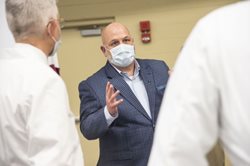A LETTER FROM COUNTY COMMISSIONER MARILYN BROWN

I hope this edition of Commissioner Connection finds you and your family safe and healthy as we all face a challenging new normal. This once in a lifetime global pandemic has upended all of our lives, threatening our own health, our families, and our jobs. Many of our neighbors are really hurting and need a hand up as we confront these unprecedented times – which is why the Franklin County Board of Commissioners allocated more than $10 million in direct assistance to our residents and small businesses early on in this crisis. My colleagues and I are committed to doing our utmost to ensure people get the help they need to weather this storm in the weeks and months ahead.
With businesses closed and employees laid off or furloughed, we know more will need to be done, and the Board of Commissioners is working diligently to make plans and provide assistance to aid in the recovery of our economy. We are also working closely with our partners at Franklin County Public Health to ensure each and every one of our residents has access to the health and safety information they need to care for their families, reopen their businesses, and go about their lives in this new normal.
In this edition of Commissioner Connection, you can read more about how our county is responding to COVID-19 and helping residents to recover. You’ll also find a link to our annual State of the County report, which details many of our accomplishments over the past year and plans for the year to come, a column about staying safe and connected even in these trying times, and an article highlighting one of our great new Board of Commissioner employees.
Thank you for taking the time to learn about your county government and what we’re doing to help our region and our residents get through this crisis. Please follow us on Twitter, Facebook, Next Door, and Instagram, and don’t hesitate to reach out to my office if we can ever be any help to you.

Commissioner Marilyn Brown
2020 STATE OF THE COUNTY REPORT
State-of-the-County-Report
Each year, the Board of Commissioners issues an annual State of the County Report to update

residents on the health and progress of Franklin County. In our fifth annual State of the County report, the commissioners are pleased to again be able to report that the state of the county is strong. To see the full report, visit
report.franklincountyohio.gov/.
FRANKLIN COUNTY IS LEADING OUR COMMUNITY’S RESPONSE TO COVID-19
 On National County Health Day in April, the commissioners detailed the ways that they continue to lead in our community’s response to the COVID-19 public health crisis, including by funding a 1,000-bed overflow surge hospital facility at the Greater Columbus Convention Center. The facility is to be cooperatively operated by the region’s three large adult hospital systems, the Ohio State University Wexner Medical Center, Mount Carmel, and Ohio Health. The hospitals will share some operations where practical, such as intake and security, and each will independently run a section of the facility, using cubicles on the convention floor for patients, and large meeting rooms as break rooms, pharmacies, and locker rooms. Facilities and utilities, food service, and janitorial services will be provided by the convention center, and the whole operation was put together in cooperation with state and local EMA and the Ohio National Guard under a $5 million contract from the commissioners.
On National County Health Day in April, the commissioners detailed the ways that they continue to lead in our community’s response to the COVID-19 public health crisis, including by funding a 1,000-bed overflow surge hospital facility at the Greater Columbus Convention Center. The facility is to be cooperatively operated by the region’s three large adult hospital systems, the Ohio State University Wexner Medical Center, Mount Carmel, and Ohio Health. The hospitals will share some operations where practical, such as intake and security, and each will independently run a section of the facility, using cubicles on the convention floor for patients, and large meeting rooms as break rooms, pharmacies, and locker rooms. Facilities and utilities, food service, and janitorial services will be provided by the convention center, and the whole operation was put together in cooperation with state and local EMA and the Ohio National Guard under a $5 million contract from the commissioners.
Since February, the commissioners have passed a number of other resolutions in support of residents and businesses, allocating more than $10 million to help those who are struggling under the public health crisis and its restrictions. They invested a million dollars in funding for small business relief, and workforce training and direct funds for employees who find themselves out of work, $750,000 in grants to the United Way, Urban League, and the Ohio Hispanic Coalition, and waived requirements to receive home-delivered meals or other services from the county’s Office on Aging, as well as contracting for an additional $250,000 in such meals. They also allocated $1,500,000 for direct assistance to struggling families, and $300,000 to Rev1 Ventures to provide support to 20 of local businesses. The commissioners also provided $1,095,590 to the Community Shelter Board and $250,000 to the YMCA to slow the spread of COVID-19 by expanding or opening new homeless shelters, allowing residents in shelters to spread out and infected people to quarantine in contracted hotels. A further $125,000 was provided to the Columbus Urban League to provide counseling, technical assistance, and financial resources education to small woman- and minority-owned businesses, and they even advanced $500,000 to the Greater Columbus Arts Council to support arts organizations that are struggling at this time.
In all, the commissioners have been quick to respond to community needs throughout the coronavirus episode, closing county facilities to all but essential business in the first weeks of the outbreak, and supporting innovative ways to reduce contact and spread of the virus in county buildings such as with video arraignments for inmates at the county jail. They’ve also devoted a large section of their website to COVID-19 information, resources (including in multiple languages) and lists of changes to county services, and are holding daily public briefings via video or telephone conference, and hosting regular informational sessions on Facebook Live.
For more information about the county’s response to the COVID-19 pandemic, the commissioners’ community support, or information about the commissioners’ daily briefings and weekly general session meetings, visit commissioners.franklincountyohio.gov.
THE 2020 CENSUS CONTINUES EVEN IN UNCERTAIN TIMES AND IS MORE IMPORTANT THAN EVER
 The U.S. constitution requires the federal government to count everyone who lives in the United States every ten years. For the first time this year, the census is mostly online, but the plan still called for local officials to promote the count at community events and for census employees to do a large part of the count by going door-to-door talking with people who haven’t responded online. Needless to say, social distancing, event cancellations, and stay-at-home orders have thrown a wrench into those plans.
The U.S. constitution requires the federal government to count everyone who lives in the United States every ten years. For the first time this year, the census is mostly online, but the plan still called for local officials to promote the count at community events and for census employees to do a large part of the count by going door-to-door talking with people who haven’t responded online. Needless to say, social distancing, event cancellations, and stay-at-home orders have thrown a wrench into those plans.
The decennial census count is used in a variety of important ways, including determining each state’s representation in Washington D.C. and funding amounts for programs that many residents rely on, like Medicare, Medicaid, SNAP, Head Start, WIC, TANF, housing, public transportation, and disaster relief, among many others. In all, Ohio receives more than $33 billion each year that is determined by census numbers, which means that we’ll lose more than $1,200 per person each year for everyone we fail to count.
The current public health crisis highlights why it is vitally important to count everyone who lives in our county. Many of our neighbors are furloughed or unemployed, and applications for social services like those funded according to the census count have skyrocketed. Many parts of Ohio are shrinking, so it’s also doubly important to be sure to count everyone in growing areas like Central Ohio.
The census is underway right now, and due to the pandemic, the response period has been extended. Every household will receive a postcard providing a unique code, and can visit My2020Census.gov to fill out the census. There are only ten questions and the survey only takes a few minutes. It’s available in multiple languages and can even be taken by phone, if you prefer. The important thing, is to respond and be counted. Your community is counting on you.
To take the census, visit My2020Census.gov. For more information, visit MakeFCCount.com.
SPOTLIGHT ON A COUNTY EMPLOYEE— JUAN TORRES
 In Franklin County, traditional Information Technology (IT) functions are provided by the Data Center, which is a division of the county auditor’s office. The commissioners, however, have long employed a Chief Information Officer to be their point person and advisor on technology and data security. Juan Torres took over that position just a year ago, and has already had an outsized influence on operations throughout commissioner agencies. A few weeks ago, he was called on to aid in the unprecedented transition of nearly all county employees from working in the office to working at home over the course of just a couple days.
In Franklin County, traditional Information Technology (IT) functions are provided by the Data Center, which is a division of the county auditor’s office. The commissioners, however, have long employed a Chief Information Officer to be their point person and advisor on technology and data security. Juan Torres took over that position just a year ago, and has already had an outsized influence on operations throughout commissioner agencies. A few weeks ago, he was called on to aid in the unprecedented transition of nearly all county employees from working in the office to working at home over the course of just a couple days.
Thanks for taking the time to talk with us today about what you do for the county, Juan. Tell us a little about yourself, where you come from, and how you came to be in the position you’re in now.
I’m originally from Youngstown, Ohio, and came to Columbus to attend Ohio Dominican University. From the moment I stepped on campus, I was immersed in technology, and I stayed there through my undergraduate degree in Computer Information Science and an MBA, and then worked for the university for ten years. About eight years ago, I had the chance to go to work for the Franklin County Department of Job and Family Services, and then moved over to the Board of Commissioners a year ago.
What was it like going from working from a university to the county, and how are the two county jobs similar or different?
I didn’t know what to expect moving from a private university to government, but I came to see that a lot of the challenges were similar in both places. Working at JFS really opened my eyes in terms of providing solutions that work for a large number of employees and employees working remotely, as well as for all of our residents, some of whom may not have ready internet access, may not speak English, or may have other barriers. At the Board of Commissioners, I have a new perspective, but a similar role. I’m supporting 14 different agencies, each of which have their own needs and challenges, but we’re working with all the same residents every day.
You work in the technology space, but not in the traditional sense of IT. Help us understand the differences between those roles.
I work every day with the Data Center, which provides that more traditional IT service, but I’m also more of an advisor to the commissioners and can end up working on all kinds of things. So, I can help with purchasing to find ways to use the same technological solution to solve problems for more than one agency, for instance, or work on data security solutions to protect the county from digital attack. I work closely with the Office of Management and Budget (OMB) on the yearly budgeting process, but also helped the dog shelter overhaul their entire system to be more efficient, and then the next day I might be discussing elections security.
Prior to the pandemic, what was a typical day like for you?
I wear a lot of different hats, so most days aren’t typical when you’re working with 14 county agencies. One example is the budgeting process I work on with OMB—that’s a nearly year-long process, so whatever we do in March doesn’t happen again until the following March, and the same with whatever happens in April, etcetera. So, if something doesn’t go smoothly this week, there’s no chance to get it right the next week. You have to get things right the first time or wait a year to smooth things out.
A little more than a month ago, the county administrator closed most county facilities. Suddenly, several thousand county employees needed to transition to working from home over the course of just a couple days. How were you and the Data Center team able to make that happen?
It’s all about strong team collaboration. About six months ago, we formed a working committee with the Data Center to begin a conversion of all county agencies to Microsoft 365. That was a big project, and we formed really strong collaborative relationships that were critical in the transition to working from home. When that came up we already had the relationships in place to bring the team back together again to put together a plan. Every agency helped out; everything was on the table and no idea was dumb. We quickly worked through issues like procuring the equipment we needed, for instance, with help from OMB to remove purchasing barriers. The technical challenges were real, but nothing we couldn’t work through thanks to the strong collaborative relationships we already had in place.
I imagine this transition would have been a lot harder or even impossible just a couple years ago.
Sure. Even six months ago would have been a very different story.
What do you like best about your job?
I love working with agencies that haven’t always been at the forefront of technology. They transition from not seeing how technology solutions can help improve their business practices to not seeing how they ever did business before. When I was applying for my MBA program, I wrote an essay about wanting to be the CIO of an innovative company, but my view has changed now. Now my goal is to bring innovation to government. That’s what I get excited about.
What’s the hardest part of your job?
Having so many unique business process and service delivery challenges and always having to reset thought process about how to do something. As government, we can’t pick and choose which services we provide, so we have to find ways to make things work and deliver the best solution to our residents.
What do you wish more people knew about what you do?
Just how cool government technology can be. I know local government isn’t always seen as a destination employer, but when people do see what all we do in the community, the initiatives we’re working on, and the solutions we have in place, I think they’re really surprised.
Anything fun your coworkers don’t know about you yet?
There’s a correlation between IT folks and science fiction fans, but that’s not me. I’ve never seen Star Wars.
STAYING SAFE, SOBER AND SOCIALLY CONNECTED DURING THE PANDEMIC
 A Guest Column by
A Guest Column by
Michael Daniels
Director, Franklin County Office of Justice Policy and Programs
I write today not as the Director of the commissioners’ Office of Justice Policy & Programs, but as a person in long-term recovery living in the age of COVID-19.
Across the nation and right here at home, we are seeing upticks in domestic violence, child abuse, and drug overdoses. The stresses of being cooped up at home, possibly with no paycheck, the kids running around looking for something to do, the worry of how the bills will be paid or how food will make it to the table – these pressures are pushing many to turn to alcohol or drugs, which in turn leads to overdose or violent outbursts.
While calls to 911 regarding domestic violence are down, severity is up. City Attorney Zach Klein reports that in recent weeks, Columbus has seen an average of 60 domestic violence arrests per week, and we’ve seen three domestic violence homicides in just the past month. Keep in mind that we had seven such murders in all of 2019.
County Coroner Anahi Ortiz has issued more and more overdose surge notifications, and we’re losing dozens of our neighbors every week, especially on the weekends, to drugs and alcohol. We’re also seeing an increase in people driving while intoxicated and an increase in dangerous and deadly accidents because of it. A combination of being isolated and alone, closure of 12-step meetings and sober spaces, and the possible arrival of a stimulus check can combine to create a situation that tempts even those of us in long-term recovery.
What can we do? The first thing we can do is equip ourselves and our neighbors with information.
Victims of domestic violence can still call the CHOICES hotline 24/7 for immediate help. That number is 614-224-4663. Victims can also text directly to 911, or to the City Attorney’s Domestic Violence & Stalking Unit at 614-653-8075.
People in active addiction can still walk in for help to Maryhaven’s Addiction Stabilization Center (MASC) on Columbus’ South Side at 1430 S High St. They can call the Franklin County Crisis Line at 614-276-2273, obtain harm reduction supplies from Equitas’ Safe Point at 1267 W Broad St, and free Narcan® from Columbus Public Health by calling 614-645-6839.
And anyone, regardless of justice involvement, can call our Office of Justice Policy & Programs at 614-525-5577, and we’ll get you connected to the resources needed for your or your loved ones.
The other thing we can do is equally important to crisis prevention. We can social-distance ourselves without being socially distant. We can call, video chat, text, or play online games.
We can order a meal and have it delivered to someone unexpectedly. Likewise with groceries. Not having to cook and not having to spend money – score for them and the kids!
We can offer to “virtually babysit” for an hour, engaging someone’s children in an online way so she can take a break and get a shower.
We can check in on our friend who is in recovery – whether 16 days, 16 months, or 16 years 4 months and 23 days (that’d be me). Just a quick “How are you doing? Do you need anything? You know you can call me any time, right?” might make the difference when his in-person counseling and 12-step meetings are all closed.
Now more than ever it’s important to stay engaged, especially with friends and family who are experiencing massive change with limited options.
We will get through this together. We will create our own new normal. And hopefully, we will be closer to one another by focusing on spending this time apart.
I appreciate you all. Be well and stay safe.